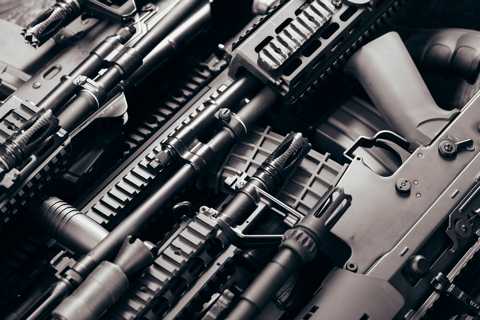
Above: Confiscated modern rifles
Arms Control in Europe
This learning unit will present the history of the development of the European arms control architecture, outline its main components and discuss its gradual unravelling, addressing conventional and nuclear dimensions. It will also examine the role of the European Union. Lastly, it will discuss the factors which may lead to a return of arms control.
Start learning unitChapters
Learning Objectives
After completing this learning unit, the students will:
- understand the origins, history and the current state of conventional arms control in Europe;
- be able to describe the purpose and functioning of the CFE Treaty, Open Skies Treaty and the Vienna Document;
- learn the difference between strategic and non-strategic nuclear weapons (NSNW);
- understand NATO nuclear sharing and Russia’s approach to NSNW;
- be familiar with the challenges of bringing NSNW under an arms control/confidence-building framework;
- understand the role played the EU and other organisations in the European arms control system;
- grasp the main challenges to arms control in Europe, including the effects of Russia’s war on Ukraine, as well as conditions for a potential return to European arms control.
Credits
Disclosures
Content Warning
This learning unit may contain audio-visual material or texts, which may not be suitable for all audiences.
Funding
This Learning Unit was produced with financial assistance from the European Union. The contents of this Learning Unit are however the sole responsibility of the author(s) and should under no circumstances be regarded as reflecting the position of the European Union.
External Links
The site may contain hyperlink text references (’Links’) to other sites that are offered by third parties. These Links are made available solely for the purpose of information and as an additional service for users. Only the respective operator is responsible for all content and statements on linked Internet sites. Therefore, PRIF cannot guarantee the correctness and accuracy or any other aspect of third party sites.
Preferred Citation
Łukasz Kulesa and Linde Desmaele, "Arms Control in Europe" in EUNPDC eLearning, ed. Niklas Schörnig, Peace Research Institute Frankfurt. Available at https://eunpdc-elearning.netlify.app/lu-11/, last modified 4 February 2026
Editorial Note
This is a beta version of the learning unit, which is regularly optimised. Please report any factual errors or discrepancies to the publisher. (support(at)nonproliferation-elearning.eu). Please note that although the original text was written by the authors, the video production and simplifications were carried out by PRIF.

